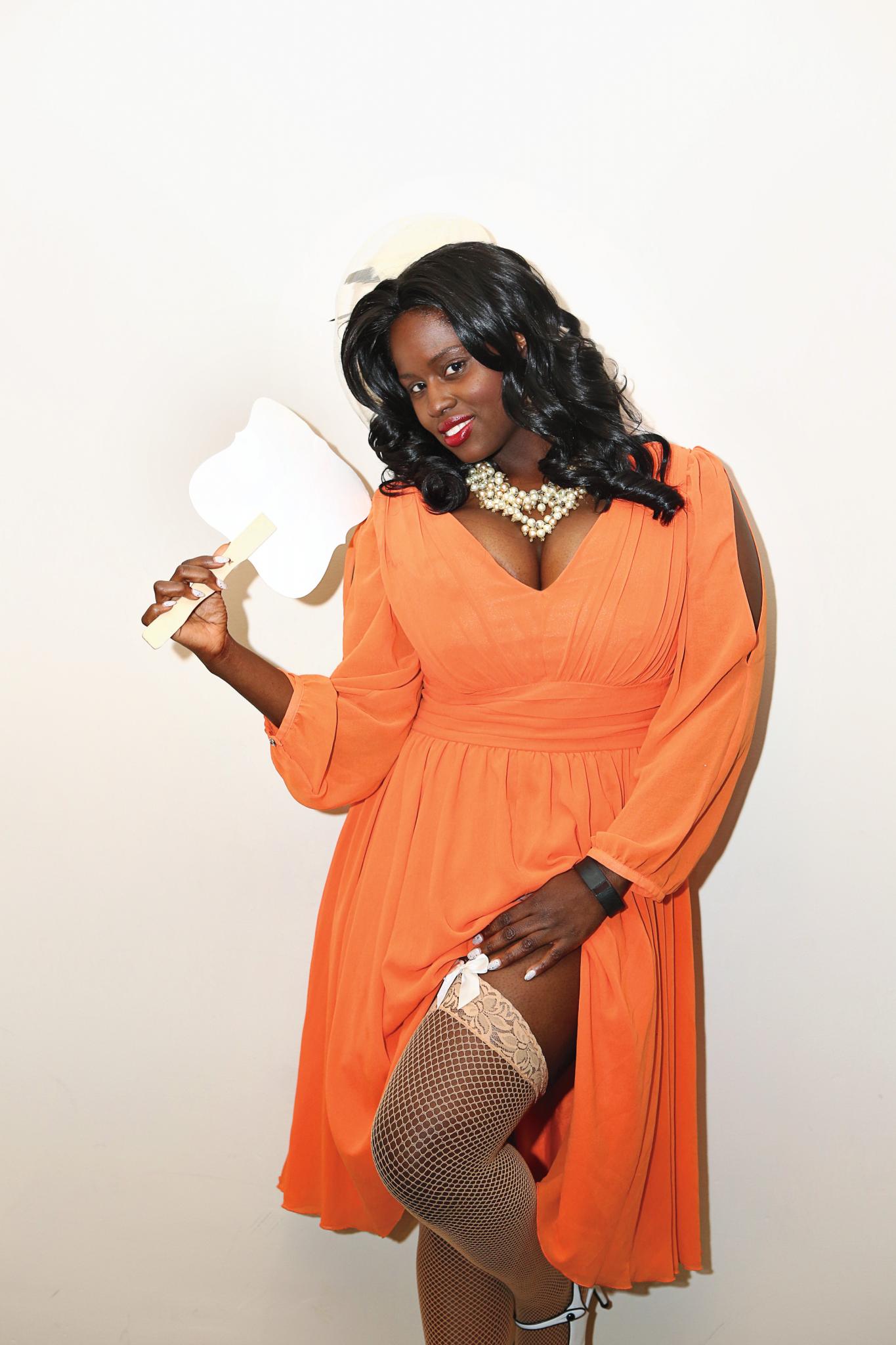
As we continue our #BringTheLove campaign, this month Relationships Editor Charreah K. Jackson explores burlesque dancing to help embrace her body—and how all women can do the same
Breathe into your p*ssy,” says Chicava HoneyChild, producer and proprietor of Brown Girls Burlesque. Ten Black women of varying shades and shapes sit in butterfly position inside a New York City dance studio wondering what we got ourselves into. We are the newest recruits of the Broad Squad Institute, a six-week intro course to burlesque, the legendary dance form that mixes storytelling and striptease. The physical stretching has nothing on the class’s psychological push to unleash our sensual selves. “Decide what part of your body or life you want to reclaim with burlesque,” Chicava encourages. “Explore your fantasies, desires and the things that bother you.” In these days of butt shots, slut walks and backside selfies, Black women need the space to define and celebrate our bodies and sexuality more than ever.
I get that opportunity as each of us in the class pops out a nipple and tries on pasties of different sizes to cover our areolae. I choose purple pasties and champagne tassels as my first burlesque accessory: I am officially a dancer. Next the bras come off—we tape our pasties on, and the fun begins as we try to get the tassels to twirl. I soon discover I have a breast twin. With clothes on, we could be cousins. But with bras off, we could be sisters. I laugh and bounce. The free-flowing feminine energy is exhilarating, and the experience is one of the most intimate of my life. Next we put the tassels on our pants or undies and try to twirl the tassels with our butts. This isn’t about turning someone else on but about reveling in our beauty and our bodies.
Every burlesque dancer needs a moniker. For our second class, a few graduates of the institute come and share the backstory of their burlesque names, including sassaBrass: The Poom Poom Priestess. “I’m a pleasure filled healer who uses performance to deliver the gospel of the p*ssy,” she shares on her Web site. “Welcome to a church where we p*ssy-pop for praise, twerk for testimony and worship in service of our liberation.” I’m in love with her fusion of spirituality and sex, something I’ve been fighting to unite as a sexual being and granddaughter of a southern minister. My grandmother avoided saying the word sex, and my mother, like her mother, skipped the sex talk with her daughter. I’m determined to end the silence on sexuality that plagued my family and many others. The next morning in the shower, words that feel southern and feminine sashay around in my mind. Peaches. Molasses. Sweet potato. Finally my burlesque name comes to me: Soufflé. The dish that makes everyday sweet potatoes sound chic fits like a nipple tassel.
Chicava started burlesque in 2006 and revisited history for her name. The Hampton University and Goddard College graduate remembered the story of Sor Teresa Chicaba, a West African nun. She was sold into slavery in the 1600’s, and after her owner died she joined a convent and later became a celebrated healer. Chicava was inspired for her stage name. “We honor women before us by being empowered,” she says. On igavemybody.tumblr.com, Chicava pays tribute to Black trailblazers of burlesque from Josephine Baker to Chinkie Grimes, who was a maid for Orson Welles before becoming a performer in the 1940’s. The renaissance of Black performers— including Jeez Loueez in Chicago, Alotta Boutté in San Francisco and Vagina Jenkins in Oakland—is growing.
Yet freeing your sexual self doesn’t come without backlash. In the music video for her song “Yoga,” Janelle Monáe trades her tuxedo for jeans and a crop top and gyrates in front of the mirror. Like me, many loved her freer persona, but it made others uncomfortable to see the singer embrace her booty. To some, she hadn’t gone far enough. One guy tweeted Monáe, saying, “Girl, stop being so soulful. Be sexy. Tired of those dumbass suits.”
Monáe’s response was poignant: “Sit down. I’m not for male consumption.” Her tweet highlighted the reality that too much of our bodies’ moving and being sexual is for men. Of course, it’s not just the fellas or society who is policing our sexuality. Sometimes it’s us. As I work on my routine for Soufflé, I get a pitch for a story titled “Guiding THOTS to freedom.” It’s from a young Black woman describing herself as a modern Harriet Tubman. Living in the shadows of Black women characterized as Jezebel and Sapphire has led many of us to fight the stereotype by being “good girls.” Too many Black bodies are used as a commodity, but it doesn’t ever justify calling another woman That Ho Over There.
In the week we learn how to seductively take off stockings and gloves, a friend excitedly shares that she’s getting fat taken out of her stomach and put into her butt. I invite her to check out the class. My butt doesn’t get bigger from going, but I do fall deeper in love with the body I’m blessed with. “Plastic surgery won’t cure self-esteem issues,” Chicava says. “We all have things we want to change. The first step is to accept yourself. Then to celebrate that you are a complete, unique phenomenon.”
I remember her words during my first burlesque performance to a mash-up of Ray Charles’s “Georgia on My Mind” and Beyoncé and Nicki Minaj’s “Feeling Myself.” I take back my brown body, one shake at a time.
Follow ESSENCE Lifestyle & Relationships Editor Charreah K. Jackson on Twitter @CHARREAH.
This article originally appeared in the July 2015 issue of ESSENCE magazine, on newsstands July 12!
